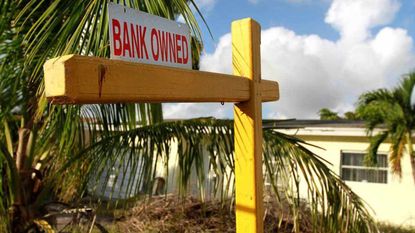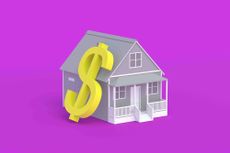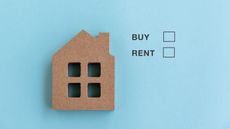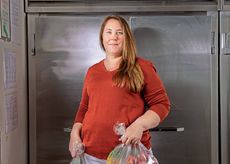Best Foreclosure Sites for Finding Properties
Wondering how to find foreclosed homes for sale for your next residence or to flip for a profit? These websites will guide you to foreclosures and real estate owned properties to buy.
- (opens in new tab)
- (opens in new tab)
- (opens in new tab)
- Newsletter sign up Newsletter


A dozen years past the foreclosure flood unleashed by the Great Recession, we’ve moved from a COVID-driven real estate boom to a period of rising interest rates (opens in new tab), persistent inflation and on-again, off-again signs of a weakening economy. Will that lead to rising foreclosures, short sales and lender-owned properties (REO, or real estate owned) as lenders take back properties whose mortgages buyers could no longer service?
That of course could mean hardship for some, but, as before, a solid opportunity for investors focused on how to find foreclosed homes to flip for profit as many American workers continue to work remotely full-time, often seeking out less-expensive cities and towns (opens in new tab).
Foreclosures on the Rise in 2022
Some statics about where we stand : According to ATTOM Data Solutions (opens in new tab), a property database provider, there were more than 30,677 U.S. properties in foreclosure – default notices, bank repossessions or scheduled auctions – in November 2022 (the most recent data), up 57% from November 2021 (but down 5% from October 2022) and 118 percent from August 2021. The zip codes with the highest foreclosure rates (opens in new tab) in November were in New York, Indiana, Illinois and Georgia, according to ATTOM.

Sign up for Kiplinger’s Free E-Newsletters
Profit and prosper with the best of expert advice on investing, taxes, retirement, personal finance and more - straight to your e-mail.
Profit and prosper with the best of expert advice - straight to your e-mail.
Buying and flipping foreclosed homes might be a path to consider for those who are building a home-selling business. It follows the maxim of buy low, sell high: learn how to find a foreclosed home, buy it on the cheap, make the needed improvements, and sell at or above the market value.
Seeking foreclosure homes near you (opens in new tab)? Foreclosure laws vary by state (opens in new tab). Check with your county, town or city. They may have foreclosure websites or other means of listing local foreclosures and REO properties. But there is a wide range of online resources for finding foreclosures, including most larger banks (we’ve listed a few):
Foreclosure Listings – Free Sites
Equator.com (opens in new tab). Equator offers free listings of homes in foreclosure – under “buy,” click on “foreclosure homes” – alongside short sales, open-market listings, and properties available through the Hubzu auction process.
HomePath.com (opens in new tab). Owned by the Federal National Mortgage Association (known as Fannie Mae), HomePath.com offers free listings of thousands of homes in foreclosure being sold by Fannie Mae.
HomeSteps.com (opens in new tab). This site is owned by the Federal Home Loan Mortgage Corporation, also called Freddie Mac. It lists homes in foreclosure that Freddie Mac is selling to investors or potential home buyers.
Zillow Foreclosure Center (opens in new tab). The popular website used by home sellers and buyers alike has its own search site for foreclosure listings. You can fashion your own method of searching, filtering by cost or location.
Realtor.com Foreclosures (opens in new tab). Realtor.com, a popular website used by new-home seekers or sellers, can help you find foreclosures. You can focus your search using a zip code and/or city. And, while we're on the subject of Realtors, by the way, you can also check with local real estate companies and their agents directly to search for foreclosed homes. Many offices have Realtors who specialize in this area.
Bank of America-owned properties and foreclosures (opens in new tab). This Bank of America site allows users to search for real estate owned or bank owned foreclosed properties, by zip code or other methods.
Foreclosure Listings – Subscription Sites
RealtyTrac (opens in new tab). After a free 7-day trial, it’s $49.95 a month, with discounts on multi-month packages. Members get access to RealtyTrac’s proprietary information, including auctions dates and locations, pre-foreclosure addresses, owner information, bank loan amounts and more.
Foreclosure.com (opens in new tab). After the free 7-day trial, it’s $39.80 per month. Subscribers receive detailed information on the listed properties, tax roll data, files provided by the lender, local school districts and other listing details.
Foreclosure Listings – Government Sites
HUD.gov (opens in new tab). Potential investors and other home buyers can find one- to four-unit residential properties that the Department of Housing and Urban Development acquired from foreclosure actions on FHA-insured mortgages.
USDA-RD/FSA Properties (opens in new tab). The United State Department of Agriculture-Rural Development and the USDA-Farm Service Agency list properties on this website. Here, you’ll find a small number of single- and multi-family homes, farms, and ranches. Buyers should contact the local USDA-RD office (opens in new tab) for more information on the property and how to buy it.
IRS Seizures (opens in new tab). This Internal Revenue Service website is a portal to finding homes and other property seized by the tax agency for nonpayment of federal taxes.

Bob is a Senior Online Editor at Kiplinger.com. He has more than 40 years of experience in online, print and visual journalism. Bob has worked as an award-winning writer and editor in the Washington, D.C., market as well as at news organizations in New York, Michigan and California. Bob joined Kiplinger in 2016, bringing a wealth of expertise covering retail, entertainment, and money-saving trends and topics. He was one of the first journalists at a daily news organization to aggressively cover retail as a specialty, and has been lauded in the retail industry for his expertise. Bob has also been an adjunct and associate professor of print, online and visual journalism at Syracuse University and Ithaca College. He has a master’s degree from Syracuse University’s S.I. Newhouse School of Public Communications and a bachelor’s degree in communications and theater from Hope College.
-
-
 Three Legal Documents Your Child Should Sign When They Turn 18
Three Legal Documents Your Child Should Sign When They Turn 18Legal documents such as durable power of attorney, a healthcare proxy and a HIPAA release can give parents the legal right to make decisions if their child needs help.
By Allen J. Falke, CPA, Esq., LL.M. • Published
-
 JetBlue's TrueBlue Loyalty Program Now Gives Perks to Infrequent Flyers
JetBlue's TrueBlue Loyalty Program Now Gives Perks to Infrequent FlyersJetBlue's TrueBlue loyalty program added new tiles and Mosaic levels to offers more ways for casual travelers to earn perks more regularly.
By Collette Reitz • Published
-
 Mortgage Rates and Payments Keep Rising, Creating Market Misery
Mortgage Rates and Payments Keep Rising, Creating Market MiseryMortgages Current mortgage rates and payments continue to rise resulting in buyer demand stalling and housing sentiment at low levels.
By Erin Bendig • Published
-
 6 Myths of Homeownership
6 Myths of HomeownershipFeeling stressed by the housing market? You might be surprised to learn that owning a home isn’t the only, or even the best, path to financial security.
By Erin Wood, CFP®, CRPC®, FBSⓇ • Published
-
 Is Relief from Shipping Woes Finally in Sight?
Is Relief from Shipping Woes Finally in Sight?business After years of supply chain snags, freight shipping is finally returning to something more like normal.
By David Payne • Published
-
 How to Shop for a Low Mortgage Rate
How to Shop for a Low Mortgage RateBecoming a Homeowner Rates are higher this year, but you can still find an affordable loan.
By Daniel Bortz • Published
-
 Looking to Relocate? Plan for Climate Change
Looking to Relocate? Plan for Climate Changebuying a home Extreme weather events are on the rise. If you’re moving, make sure your new home is protected from climate change disasters.
By Rivan V. Stinson • Published
-
 Retirees, A Healthy Condo Has a Flush Reserve Fund
Retirees, A Healthy Condo Has a Flush Reserve FundSmart Buying Reserve funds for a third of homeowner and condo associations have insufficient cash, experts say. Here are some cautionary steps you should take.
By Patricia Mertz Esswein • Published
-
 Economic Pain at a Food Pantry
Economic Pain at a Food Pantrypersonal finance The manager of this Boston-area nonprofit has had to scramble to find affordable food.
By Emma Patch • Published
-
 The Golden Age of Cinema Endures
The Golden Age of Cinema Enduressmall business About as old as talkies, the Music Box Theater has had to find new ways to attract movie lovers.
By Emma Patch • Published









